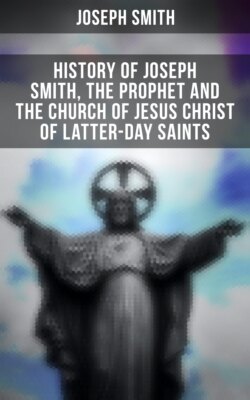Читать книгу History of Joseph Smith, the Prophet and the Church of Jesus Christ of Latter-day Saints - Joseph F. Smith - Страница 77
На сайте Литреса книга снята с продажи.
Footnotes
Оглавление1. In order to group the correspondence concerning the troubles in Jackson county as close to the recital of those events in the text of the Prophets narrative as may be, several of the communications in this chapter are taken from the place assigned them by previous editors and given in this concluding chapter of Volume I.
2. In my judgment, it does seem that under the powers conferred upon the executive by the provision of the fundamental law of the state—the constitution—and the militia law he quotes, the governor could have granted the request of the Saints to be protected in their homes, until peace was restored. Surely the clause, "or other emergency," in the section of the law just referred to, was broad enough to justify him in protecting, by the State militia, twelve hundred citizens of the United States in their homes until mob-violence had subsided—until respect for the civil law had been restored, and these citizens allowed to dwell in safety upon the lands they had purchased from the general government. Under these provisions he could have "curbed those cruel devils of their will," without "doing even a little wrong, in order to do a great right"—without "wresting the law to his authority."
3. It required no great wisdom, however, to forsee that for the Saints to return to their homes, and then be left there without protection—left to the mercy of human wretches, in whose veins ran none of the milk of human kindness—would not be far removed from suicide, as the mob greatly outnumbered the Saints. To return under these circumstances would only be laying the foundation for a greater tragedy than the one already enacted; and the brethren wisely concluded not to attempt to regain possession of their homes, until some measure was adopted to protect them when there—until "God or the President ruled out the mob."
4. Thus ended the only effort that was ever made by the officers of Missouri to bring to justice these violators of the law. One class of citizens had conspired against the liberties of another class, and being the stronger had, without the authority of the law, or shadow of justification, driven twelve hundred of them from their possessions, and there was not virtue enough in the executive of the state and his associates to punish the offenders. The determination of the mob to resist the law was stronger than the determination of the state officers to execute it and make it honorable. And yet the constitution of the state made it the imperative duty of the executive to "take care that the laws are faithfully executed;" and the laws of the state empowered the commander-in-chief of the militia (the governor) "in case of * * * insurrection, or war, or public danger, or other emergency, to call forth into actual service such portion of the militia as he might deem expedient." With this power placed in his hands by the laws of the state, Governor Dunklin permitted mobs to overawe the court of inquiry he himself had ordered, and allowed them to continue unchecked in their unhallowed deeds of devastation and violence. And while the mobocrats triumphed over law and order, the governor's letters to the leading Elders of the Church contained many pretty, patriotic sentiments, but he lacked the moral courage to execute the law of the state.
5. The letter here referred to will be found on pages 476-8.
6. The arms were never returned to their owners. Before Lucas received the Governor's order, forwarded to him by the brethren, he had left Jackson county, settled in Lexington, Missouri, and resigned his commission. Subsequently Governor Dunklin issued a second requisition for the arms, this time directing it to Colonel Pitcher; but between the issuing of the two orders, the first to Lucas and the second to Pitcher, the arms were distributed among the mob, and they insolently boasted that the arms should not be returned notwithstanding the order of the chief executive of the state.
End of Volume I.
